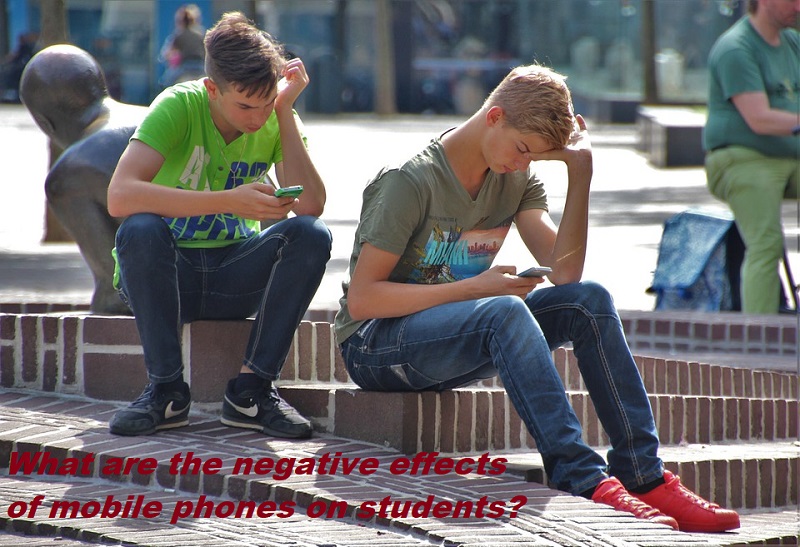Using smartphones among students can pose several issues. Currently, smartphones have become ubiquitous worldwide, and students from all corners of the globe utilize them for various purposes. Some students engage in lengthy conversations with friends, while others invest significant time playing games on their phones.
Today, we will delve into the adverse impacts of mobile phones on students. The internet serves as a vast source of knowledge for students, and smartphones have undeniably simplified life. Now see below, we will examine the negative effects of Mobile phones on students.
What are the Negative Effects of Mobile Phones on Students

Time smartphone use can cause a variety of complex problems in the body. According to a Huffington Post report citing multiple studies, users are experiencing physical and mental problems due to excessively used mobile phones. Excessive use can lead to a variety of problems. It is good to know what the problems may be.
1. Fear of Losing
Fear of losing a mobile phone is a problem that arises in mind. Researchers have dubbed this horrible disease of losing contact with mobile phones nomophobia’; Whose full name is No Mobile-Phone Phobia’. Currently, 53 percent of young people in the UK and 29 percent of young Indians suffer from the disease.
The existence of a disease that was not imaginary even 5 to 10 years ago, psychologists are worried about the disease at home and abroad. It also plays an important role in the case of the negative effects of mobile phones on students.
2. Sending Messages in Sleep
Sending messages and chatting can also affect sleep. There may be a problem with ‘slip texting’. If you have this problem, you don’t remember what message is sent to whom in your sleep at night. The message goes to the unwanted number from the mobile phone in your hand even in your sleep as you have to send the message in your head.
According to psychologists, many people spend their days with anxiety, work stress, and mobile phones. Slip texting can happen in such cases.
3. May Reduce The Brightness of The Eyes
Well-known eye experts in the UK have warned that excessive use of mobile phones can lead to visual impairment. This can lead to myopia or poor eyesight. Smartphone users usually use it at a distance of 30 cm from the eyes. However, in many cases, the distance is only 18 centimeters.
When reading newspapers, books, or anything else, there is usually an average distance of 40 cm from the eyes. Using a smartphone too close to the eyes for extra time can lead to genetic problems and other physical problems.
The role that is constantly played in the creation of myopia. Various researchers around the world call it ‘epigenetics’. Researchers have long advised not to keep an eye on smartphones and comply. He advised staying away from mobile phones even if it is daily.
Researchers in the UK have also emphasized the importance of considering age when using smartphones, as it can be very dangerous for students. This is another important factor for the negative effects of mobile phones on students.
4. Less Hearing in The Ears
Depending on the habit, mobile phones can lead to another serious ear problem. Again, if you listen to loud music using headphones, it affects the inner ear cells and causes abnormal behavior in the brain. The risk of becoming deaf after a while is very high.
5. Damage to The Bones And Joints of The Body
This is one of the reasons for the negative effects of mobile phones on students. Excessive typing of messages for a long time can cause severe pain in the joints of fingers and body. If the condition worsens, problems like arthritis can occur.
In addition, many people use the mobile phone at work and talk with the phone between their shoulders and ears. Again, many are inclined to send messages for a long time. Sitting posture alone can cause various problems in the body.
6. Sperm May be Reduced
According to researchers around the world, mobile phones emit high-frequency electromagnetic radiation. There may be a lot of links between these harmful waves and brain cancer. The effects of these harmful waves can damage different tissues of the body.
Again, there is a risk of damage to the male reproductive system. According to world-renowned researchers, harmful waves emitted from mobile phones greatly affect sperm and can reduce sperm density. One of the examples of the negative effects of mobile phones on students.
7. When The Ring Tone
Another terrible problem can be caused by anxiety or depression. If such a problem occurs, the user suddenly hears or feels it even if the phone does not ring or does not vibrate and even gets startled. Excessive use of mobile phones can lead to various health problems. Many users do not even notice when they start suffering from such problems again.
8. No Sleep
Excessive use of smartphones, tablets, laptops, desktops, and excessive television viewing during sleep can lead to sleep problems or insomnia. This is a very bad aspect for the country and the nation, and its impact on student life is very bad.
Excessive use of such technology products before going to sleep can lead to melatonin deficiency in the body; The main reason is the bright light emitted from technology products. At one stage, severe sleep problems occur, and there is a high risk of sleep disorders.
9. Dirty Than Toilet Seats
Another surprising fact is that some US researchers have found that mobile phones contain more bacteria than toilet seats. Smartphones have become a haven for germs due to not cleaning regularly. Although the bacteria in the mobile phone are not very harmful to the user, they can spread the infection or virus, various researchers said.
10. Tumour
Over time, there has been extensive research into understanding the effects of cellphone radiation on children. Since children are still at a stage where their bodies are undergoing change and growth, the effects of mobile radiation may differ from those of adults.
Children and students who use their phones for extended periods are more likely to develop anti-malignant tumors, especially in the ear and brain areas, due to having the phone close to their ears. Bones, tissues, and protective coatings for organs such as the brain are still very thin in students and children.
Thus, these organs absorb 80% of the radiation emitted from mobile phones. Radiation can have strange effects on the human body, sometimes directly affecting the nervous system. The World Health Organization has classified it as a “potential carcinogen” and carries a potential cancer risk.
11. Problems with Brain Function
A very dangerous factor in the case of the negative effects of mobile phones on students. Its internal electromagnetic waves work primarily for all types of communication on mobile phones. The brain has its electrical tendencies and communicates in the neural network.
In studying, waves from the phone can easily penetrate directly into the inner parts of the brain because their brain defense is not tightened. Studies have shown that just talking on the phone for 2 minutes changes the electrical activity inside a child’s brain.
This defective activity can cause changes in mood patterns and behavioral tendencies and cause children and students to have trouble learning new things or concentrating properly.
12. Academic Performance
Many children and students take their phones with them to school. Chatting with friends or even playing games during school breaks or even in class, this problem increases day by day. This results in students failing to concentrate in class, skipping important lessons, and, as a result, having problems with reading and exams. The negative effects of mobile phones on students are largely responsible for this.
13. Do Wrong in School
Smartphones not only distract students and children from their studies, but they can score well on exams as well as create and increase their misuse. It has been widely observed that students and children use inbuilt calculators in exams that are not approved in school, hide copy or reference information for exam cheating, and even exchange answers with other students by telling them to be silent during exams. This kind of behavior affects not only academic performance but also their personality.
14. Inappropriate Media
Like other gadgets, mobile phones are also tools or equipment and can be used for the wrong purpose. Children can see inappropriate messages, pictures, or other media shared by their friends or groups and pass them on to others.
They change their perceptions and thinking processes and turn to pornography early. Even exchanging their image irresponsibly can cause a stigma that will affect their lives for a long time.
15. Sleep Disturbances
Students can talk to friends late at night, play games, or scroll through social media, leading to fatigue and restlessness over time. Less sleep also affects learning life, as children and students need too much sleep to concentrate on what is taught in school. Therefore, it has a domino effect that penetrates all levels of their lives.
16. Medical Issues
Having chips on mobile phones in students’ free time means they don’t participate in physical activity and don’t get fresh air. This puts them at risk for obesity and other illnesses, later leading to harmful diseases such as diabetes and high blood pressure.
17. Mental Health
On social media, students and children can come in contact with cyberbullies who harass and threaten them on the Internet. Many students who have been cyberbullied can only admit their experiences much later in life when they have already suffered emotional damage.
Students who wait too long online don’t pay attention; social media can also cause frustration and anxiety. So the negative effects of mobile phones on students affect mental health in many ways.
Why are Smartphones Affecting Kids Negatively?
Smartphones can gobble up a lot of a kid’s time. Instead of playing outside or reading a book, they might spend hours on their phone. This can make them miss out on important real-world experiences. Those little screens can mess with their sleep. The bright light from phones can trick their brains into thinking it’s still daytime, even when it’s bedtime. So, they might not sleep as well, and good sleep is super important for growing brains.
Smartphones can be kind of addictive. Apps and games are designed to keep kids hooked. That means they might have trouble putting the phone down when they should be doing homework or spending time with family. Too much screen time can lead to problems like eye strain. Staring at a screen for too long can make their eyes feel tired and dry, and that’s no fun.
There’s the issue of cyberbullying. Kids can be mean to each other online, and it can hurt just as much as in person. Parents need to watch out for this and talk to their kids about how to handle it. Smartphones can sometimes make kids forget how to have face-to-face conversations. It’s important for them to learn how to talk to people in real life, not just through texts and emojis.
Some stuff on the internet isn’t suitable for kids. They might stumble upon things they shouldn’t see, which can be scary or confusing.
How Do Smartphones Affect Students?
Smartphones can be super distracting. Games, social media, and messages can take your focus away from studying. Using your phone before bed can mess up your sleep. It tricks your brain into thinking it’s daytime. Some people get addicted to their smartphones. They can’t stop using them, even in class. It’s not good for grades or health.
Sadly, smartphones can be used for bullying. Hurtful messages and pictures can spread quickly. Mobile phones emit radiofrequency radiation, connecting them to cell towers for coverage. This signal, known as electromagnetic radiation (EMF), encompasses various types, including heat and microwaves, emitted during phone use.
Placing mobile phones near our ears directs radio waves straight into our brains, impacting overall health significantly. The World Health Organization (WHO) has established a strong link between mobile phone use and an increased cancer risk.
Children are particularly susceptible to mobile phone’s adverse effects due to their ongoing development. Carrying phones in their hands, pockets, or bags leads to excessive EMF exposure, exacerbated when kids place phones near their heads while sleeping.
Safety Tips to Reduce Mobile Phone Risks
- It is very important to take proper measures to ensure protection from mobile phones when students grow up.
- Refrain from giving cell phones to children and students under 18. Young children or students may not develop the skull bone density and protective tissue needed for the brain, making them vulnerable to the effects of radiation.
- Use a wired headset instead of holding the phone to your ear when your child is talking on the phone.
- When traveling, you should avoid giving your child your mobile phone constantly. The car’s metal body blocks the signals, increasing the power of the phone to catch them.
- Do not allow your child to use a mobile phone where the signal strength of your mobile is weak. Mobiles, in such cases, amplify their radiation to get a good signal strength which can be harmful to the baby.
- As adults, parents, and other people in the home need to limit their phone use when children and students are around. This is important not only to avoid radiation but also to create a pattern of behavior in students.
- It is advisable to take extra care if the mobile phone towers are near your home or your child’s school, as the radiation exposure is higher than usual.
- Completely limit your child from taking phone calls to the school. Keep the school’s contact number and provide your number to the school for emergencies.
- Keep your mobile phones safe with you and out of reach of your students at night. Students can try to use it silently in your absence.
What Should the Parents of Students Do About the Harmful Effects of Mobile Phones?
Parents of students can take several practical steps to address the negative impacts of mobile phones on their children:
- Open Dialogues: Initiate open and honest conversations about mobile phone usage. Talk to your children about the potential harm caused by excessive screen time and the importance of setting limits.
- Set Boundaries: Establish clear rules regarding phone usage. Encourage designated “phone-free” times, such as during meals and study hours. Make sure these rules are fair and consistently enforced.
- Monitor Screen Time: Keep an eye on how much time your child spends on their mobile phone. Many devices now offer parental control features that allow you to set screen time limits.
- Encourage Outdoor Activities: Promote physical activity and outdoor play. Encourage your child to engage in sports or hobbies that don’t involve screens.
- Educate on Health Risks: Inform your child about the potential health risks associated with excessive phone usage, such as eye strain, sleep disturbances, and the effects of electromagnetic radiation.
- Model Healthy Behavior: Be a role model. Show your child that you can also manage your phone usage responsibly. Avoid using your phone excessively, especially during family time.
- Designate Charging Stations: Keep mobile phones out of bedrooms during the night. Designate a common charging station in a shared area to discourage late-night phone use.
- Promote Face-to-Face Interaction: Encourage your child to spend quality time with friends and family in person rather than through screens. Organize social activities and gatherings.
- Stay Informed: Stay updated on the latest trends and apps your child is using. Be aware of who they are communicating with online and ensure they practice online safety.
- Reward Responsible Usage: Acknowledge and reward responsible phone usage. Praise your child when they follow the established rules and guidelines.
Final Word
A cell phone has two sides, just like every other piece of technology or item we’ve used. The smartphone has impressive technical capabilities and is an excellent learning tool for pupils. However, regulating things and limiting their use goes a long way in protecting pupils’ safety and forming positive behavioral patterns in them. If the aforementioned guidelines are strictly adhered to, the detrimental impacts of mobile devices on kids can be avoided.






